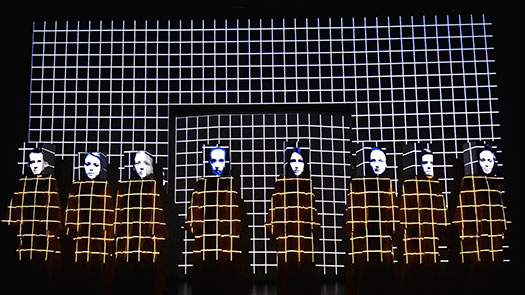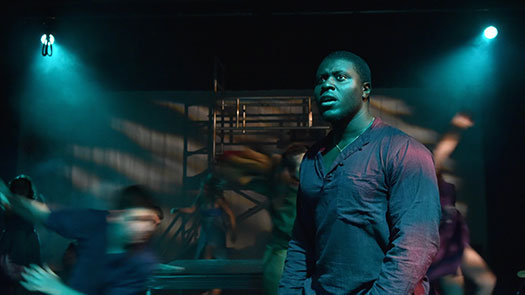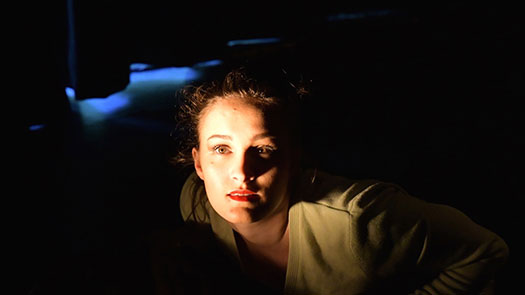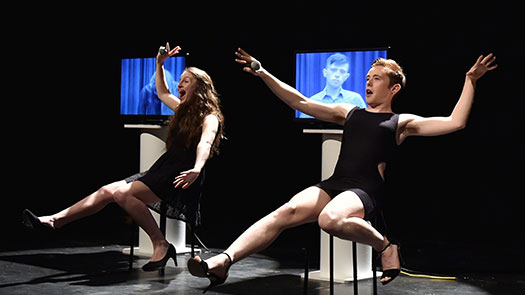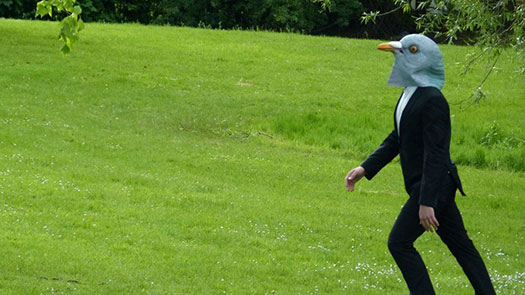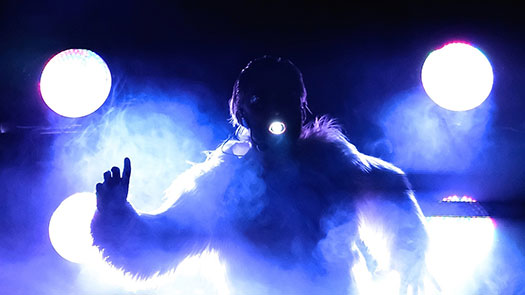Drama and
Contemporary Performance
Drama and Contemporary Performance
BA (Hons) Drama and Contemporary Performance is all about your development as a theatre artist, performer, thinker and professional, in a city with a vibrant theatre and performance scene.
With a focus on cutting edge contemporary performance and theatre, the course combines artistic practice and academic enquiry, and draws on established local, national and international networks.
This course focusses on developing you as an informed and original maker of theatre, whether revisiting existing texts or exploring new forms and approaches. It also builds your skills and creativity as a theatre performer, both individually and in collaboration with others.
Working with leading theatre academics, artists and professionals, you will be part of a close-knit course community, working in one of the most thriving sectors of a city internationally acclaimed for its creativity and cultural industries.
The programme aims to develop you as a skilled, creative and confident professional, capable of working across a number of related career paths. As one of our graduates you could go on to work as a theatre maker, performer, actor, director, writer, teacher, facilitator, producer, technician and/or academic. You will also be in a position to continue with postgraduate study, and to apply the skills you develop in a wider range of creative and other fields.
Special Features
- —Modern Facilities: Based in a modern and spacious new building with a range of fully equipped performance studios, teaching and social spaces and a 180-seat theatre.
- —Expert Faculty: Taught by expert lecturer/practitioners with many years of experience developing artists, performers, producers, scholars and teachers.
- —Technical Support: Excellent production support and resources provided by a large technical team.
- —Creative Community: Be part of the creative and social communities of the Manchester School of Theatre.
- —Vibrant theatres: Access to exciting new professional theatre at HOME, The Lowry, Contact Theatre, Royal Exchange Theatre, Factory International and other city venues.
- —Professional Networks: Strong industry connections to build professional networks and understanding in preparation for professional life as a graduate.
Course Content
The first year of the programme supports you to develop a range of performance skills, particularly relating to the voice, body and improvisation, and the performer’s integral relationship to the creative process. As well as this you will explore the practices of directing and devising theatre, introducing new creative approaches aimed at rethinking what a theatre experience can be, whilst the critical component of the course introduces writing and thinking skills that can be applied to key concepts and debates. The year ends with a large-scale ensemble performance production.
The second year takes a more in-depth look at approaches to the creation of new theatre and performance, as well as enhancing your skills in performing and acting. Alongside these, the critical component will enable you to understand and contextualise contemporary theatre in a number of ways. You will also have a choice of performance-related projects, creatively addressing different professional approaches to making theatre.
The final year of the degree focuses on more independent performance projects, working in different sized groups and culminating in public-facing festivals of performance. Alongside these, you will develop research projects relating to your own particular interests, and the practical projects you have been involved in. You will also be supported in your broader development as a professional, alongside visits to arts organisations in the city and input from industry experts, as you progress towards graduation and onwards.
Year 1
In Year 1, you will be introduced to key concepts and strategies relating to the production of theatre, including performance styles and techniques, contemporary debates in the context of drama and the creative process, before developing your own staff-led performance project.
Performing
This practical module will introduce you to a range of performance strategies, styles and techniques, with an emphasis on the performer’s integral relationship to the creative process.
Critical Perspectives 1
This module will introduce you to key critical concepts and debates in drama, theatre and performance. You will learn about and debate these issues in the context of drama and contemporary performance. It will also introduce you to critical writing and thinking skills that are essential to both sustained academic research, university study, and to professional creative practice.
Project 1
This module provides you with the opportunity to develop and apply performance practice within a staff-led, ensemble-based performance project.
An Introduction to Directing and Dramaturgy
This studio-based module introduces and explores some of the key practices and strategies employed in the making of new theatre, using a combination of practical exercises and critical study.
Year 2
Year two will allow for the development of specialisations in performance and composition, acting and directing, whilst gaining an understanding for the history of theatre throughout the 20th and 21st Centuries. The year culminates in a public-facing performance and critical reflection.
Performing and Acting
Building on the work undertaken in the Performing module at Level 4, this module will introduce students to key practical skills in acting and performing informed by a range of artists and companies.
Critical Perspectives 2
This module will contextualise contemporary theatre and performance within the historical, artistic and conceptual contexts of the 20th and 21st centuries. The module will introduce you to the lineages of performance and theatre and its study through the twentieth century, and use that context to discuss and debate current issues in contemporary theatre and performance. Learning will take place through seminars, lectures, independent study, essays, and presentations. Assessed work will include student led presentations on historical cases and an essay on a relevant topic of each student’s choosing based on their own research. This will serve to develop your skills in independent research, organisation, writing, presentation and critical thinking.
Project 2
This module facilitates a range of staff-led public-facing performance projects, in which you will engage directly in the creative process, performance, production and critical reflection.
Theatre Making
This module explores collaborative theatre-making in relation to contemporary play texts and devising practices, and includes an extended experience of creative collaboration working in small groups.
Year 3
In Year 3 you will enhance your understanding of and discuss critical issues in drama whilst developing research skills and self-evaluation methods. The year also features two performance projects undertaken with the supervision of tutors and professional artists.
Project 3
This module provides you with the opportunity to engage in two performance projects, one with the input of a professional artist and the other tutor supervised, with the second responding to the experience of the first.
Professional Practice
This module enables you to adopt an informed and pro-active approach to the key professional pathways available to you when they graduate, with a focus on professional skills, profiling, contexts, processes and outputs.
Project 4
This module facilitates a range of student-led, supervised performance projects, in which you will engage directly in the creative process, performance, production and critical reflection.
Critical Practice in Contemporary Performance
This module enables you to develop you critical analysis and research skills in theatre and performance practices. Building on the work undertaken at earlier levels of study, you will further develop your independent research skills. You will be supported to select and develop research topics based on your own interests, and topics that will also be relevant to your future professional careers.
Assessment Weightings & Contact Hours
10 credits equates to 100 hours of study, which is a combination of lectures, seminars and practical sessions, and independent study. A three year degree qualification typically comprises 360 credits (120 credits per year). The exact composition of your study time and assessments for the course will vary according to your option choices and style of learning, but it could be—
Study
- Year 1 40% lectures, seminars or similar; 60% independent study
- Year 2 40% lectures, seminars or similar; 60% independent study
- Year 3 40% lectures, seminars or similar; 60% independent study
Assessment
- Year 1 100% coursework;
- Year 1 100% coursework;
- Year 1 100% coursework;
Staff
- John Deeney
Programme Leader
— - Patrick Campbell
Senior Lecturer
— - Josh Edelman
Reader in Drama and Contemporary Performance
— - Kevin Egan
Senior Lecturer
— - Shane Kinghorn
Senior Lecturer
— - Neil Mackenzie
Senior Lecturer
— - Michael Pinchbeck
Professor of Theatre
— - Rachel Rimmer-Piekarczyk
Senior Lecturer
—
Student Profiles
Visit the Degree Show website to view profiles of some of our graduating students.
Graduates
This course will enable you to gain the skills and understanding to work professionally as a theatre maker, performer, director, producer, facilitator or teacher, or to move into other creative industries, as well as to engage in further academic study and research. You will also develop key transferable skills including teamwork, creative thinking, leadership and communication.
Making an Application
How to Apply
Apply through UCAS.
You will be notified of our decision through UCAS.
Entry Requirements
| UCAS Tariff Points/Grades Required | 104-112. GCE A levels - grades BCC or equivalent Pearson BTEC National Extended Diploma - grade DMM Access to HE Diploma - Pass overall with a minimum 106 UCAS Tariff points UAL Level 3 Extended Diploma - grade of Merit overall OCR Cambridge Technical Extended Diploma - grade DMM T level - We welcome applications from students undertaking T level qualifications. Eligible applicants will be asked to achieve a minimum overall grade of Merit as a condition of offer IB Diploma - Pass overall with a minimum overall score of 26 or minimum 104 UCAS Tariff points from three Higher Level subjects Other Level 3 qualifications equivalent to GCE A level are also considered. A maximum of three A level-equivalent qualifications will be accepted towards meeting the UCAS tariff requirement. AS levels, or qualifications equivalent to AS level, are not accepted. The Extended Project qualification (EPQ) may be accepted towards entry, in conjunction with two A-level equivalent qualifications. Please contact the University directly if you are unsure whether you meet the minimum entry requirements for the course. |
|---|---|
| Specific GCSE Requirements | GCSE grade C/4 in English Language or equivalent, e.g. Pass in Level 2 Functional Skills English |
| International Baccalaureate | IB Diploma with minimum 26 points overall or 104 UCAS Tariff points from three Higher Level subjects. If you plan to meet the Level 2 course requirements through your IB Diploma you will need to achieve Higher Level 4 or Standard Level 5 in English Points |
International Students
A minimum IELTS score of 6.0 overall with no individual element below 5.5 is required.
There’s further information for international students on our international website if you’re applying with non-UK qualifications.
Tuition Fees 2026 Entry
UK and Channel Island students
Fees for this course have yet to be confirmed and will be updated as soon as more information is available.
Find out about the extra support we may be able to provide with our scholarships for UK students.
EU and non-EU international students
Full-time fee: £21,500 per year. Tuition fees will remain the same for each year of your course providing you complete it in the normal timeframe (no repeat years or breaks in study).
Many of our international students are eligible for a discount on their tuition fees. Visit our scholarships and funding pages to find out what's available for you.
Additional information
A degree typically comprises 360 credits, a DipHE 240 credits, a CertHE 120 credits, and an integrated masters 480 credits. For courses that offer a placement year option that starts in September 2025, the tuition fee is £1,905 (subject to Parliamentary approval). For courses that offer a study year abroad option that starts in September 2025, the tuition fee is £1,430 (subject to Parliamentary approval). Placement Year fees and study abroad fees for subsequent academic years may increase for inflation to reflect increased costs of course delivery (up to a maximum of 10% each academic year) and/or changes in UK government regulation. Inflationary increases will be calculated by reference to RPIx (RPIx is a measure of inflation in the UK). Fee increases are subject to limits imposed by UK government regulation.
See Funding your studies for further information and advice.
Additional Costs
Specialist Costs
Optional £600* —All of the books required for the course are available from the library. The University also has PC labs and a laptop loan service. However, many students choose to buy some of the core textbooks for the course and/or a laptop. Students may also need to print their assignments and other documents. Campus printing costs start from 5p per page. Estimated costs are £300 for a laptop up to £100 each year for books and printing. Total optional cost: £600.
Other Costs
£200*Students will need to see a number of professional performances over the three years of the degree, mostly in the Manchester area. Some venues will offer special ticket deals for DCP students, so estimated cost: £60-£70 per year.
* All amounts shown are estimates.
